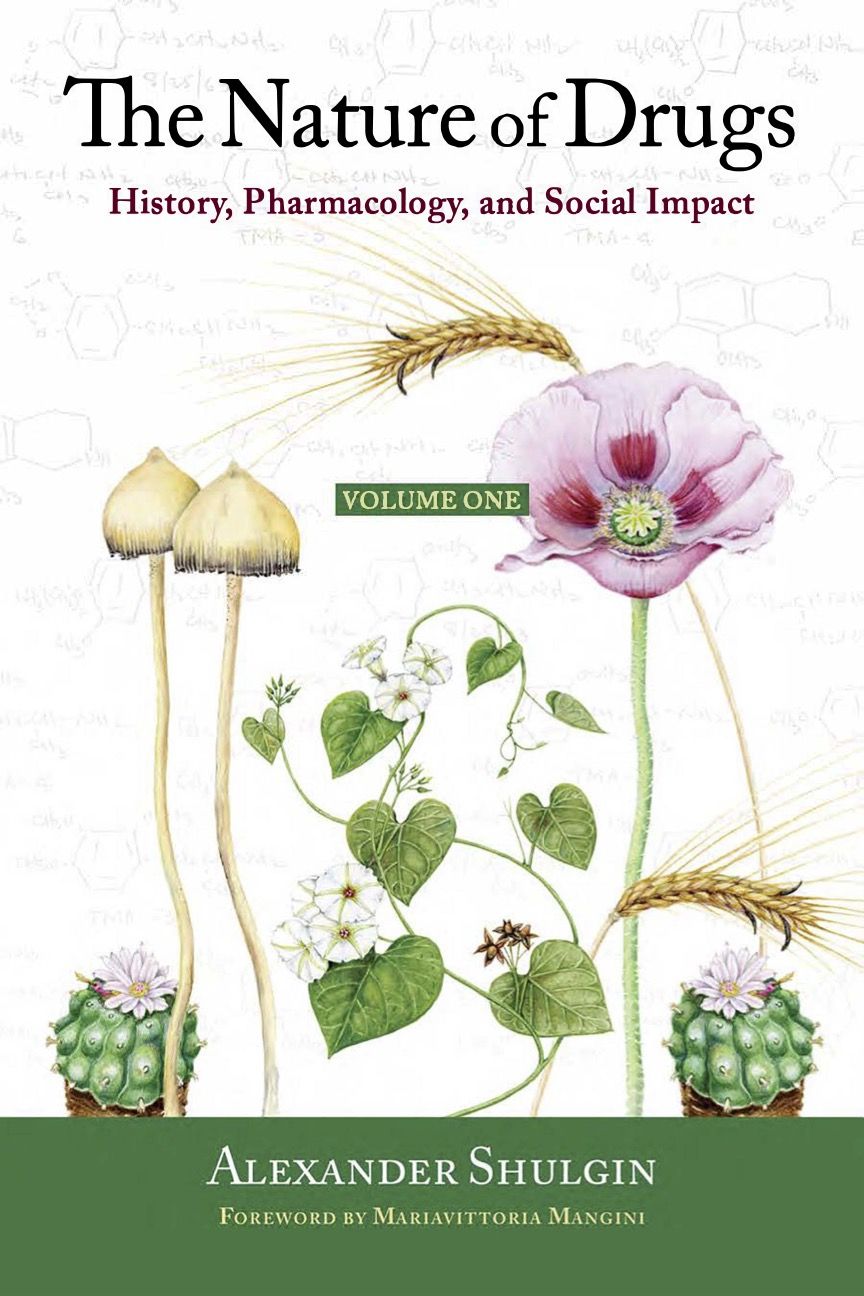Free audio samples!
Step into the classroom with the Godfather of Psychedelics!
Listen to Sasha Shulgin in The Nature of Drugs, Volume One audiobook.
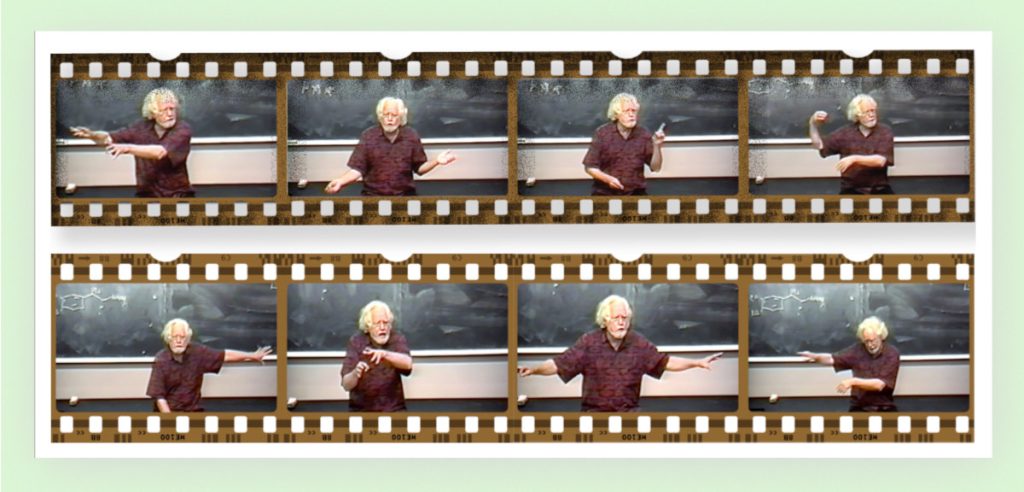
Listening to Sasha Shulgin lecture about the Nature of Drugs was not a dull experience! These filmstrip images show an animated “Godfather of Psychedelics” gesticulating in front of the chalkboard. [San Francisco, Calif., 1987.]
Transform Press is excited to share free sample audio clips from the original recordings of the late Alexander “Sasha” Shulgin’s historic lecture series in the new The Nature of Drugs, Volume One* audiobook. These rare clips bring to life his entertaining teaching style and personal philosophy. Play them here, and read this post to learn why Sasha Shulgin was called the Godfather of Psychedelics.
*The Nature of Drugs, Volume Two will be released on June 28, 2023.
When listening to recordings of Sasha Shulgin teaching “The Nature of Drugs” at San Francisco State University, you will quickly realize this is so much more than a college course about the history, pharmacology and social impact of drugs. You are listening to one of the greatest scientists of the 20th century, the controversial genius who discovered that MDMA is psychoactive, the chemist who famously invented more than half of all known psychedelic drugs and experimented with them on himself, and with his wife and friends.
Sasha taught the class in 1987 during the height of the War on Drugs and not long before committing one of the most subversive acts of defiance against the government’s policies. He and his wife Ann cowrote two books containing actual recipes for making psychedelic drugs. Each volume contained two parts: 1) a fictionalized autobiography that told the tale of their romance and adventures together, and 2) a psychedelic cookbook with precise instructions for synthesizing drugs in the laboratory.
Even though publishing the recipes was perfectly legal, no publisher would touch the manuscript for PIHKAL: A Chemical Love Story*. So the Shulgins founded Transform Press and published it themselves in 1991. They published TIHKAL: The Continuation in 1997. While the government was preaching, “Just say no to drugs,” Sasha and Ann were teaching, “Just say know.”
* PIHKAL stands for Phenethylamines I Have Known and Loved; phenethylamines are the class of psychedelic drugs that includes mescaline (derived from peyote) and MDMA (popularly known as “Ecstasy” or “Molly”). TIHKAL stands for Tryptamines I Have Known and Loved; classic tryptamines include LSD and psilocybin (the main ingredient in “magic mushrooms”).
The Story Behind the Audiobook
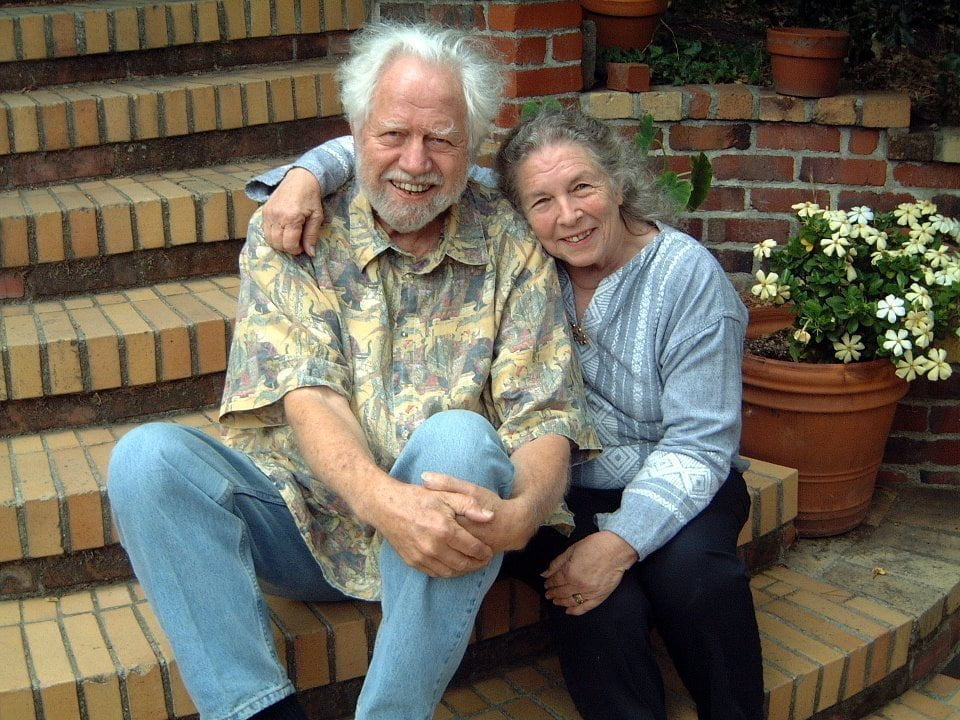
The Shulgins founded Transform Press to self-publish PIHKAL and TIHKAL, which became instant classics of psychedelic literature. [Lafayette, Calif., circa 2007. Photo by Jason Tucker.]
On January 29, 1987, Sasha walked into the classroom where students were waiting for the first lecture on “The Nature of Drugs.” The six-foot four chemist with unruly white hair and a matching beard might have been intimidating if not for the twinkle in his eyes. He began with a seemingly prosaic introduction:
The name of this course is the “The Nature of Drugs.” It was originally going to be “Drugs and Society,” which would be kind of a neat thing because you can go and tie everything together in a nice way, but some other department had already stolen the name and refused to give it up. They had to find something new and “Nature of Drugs” had not been used.
Sasha said the name didn’t matter because it didn’t affect what he intended to cover, which was “drugs in the broadest definition of the term, and the attitudes of society towards them.” But his introduction said something more. He wasn’t merely lamenting that another department had “stolen” his name for the course. He was telegraphing his disdain for authority, a theme that recurs repeatedly in the lectures and Shulgin’s other writings. And his assertion that he would teach what he wants regardless of the name, is the same attitude reflected in his decisions to voice unpopular opinions and publish material that was considered subversive by the government and much of the public.
He told the students they didn’t need a chemistry background to take the course, joking that he would try to resist his “big temptation to put great big hexagons on the board with wiggly chains out from the amino groups and methoxy groups and marvelous things like nitrogens.”
Even if Sasha couldn’t resist drawing diagrams of molecules, his students didn’t have to memorize them. He explained he hated when people were preoccupied with taking notes in class, then “desperately” tried to memorize them. And he didn’t like tests. “I’m forced to give a midterm. I’m forced to give a final. I don’t want to.” Sasha’s solution: “I have never given a course in my entire life that is not open book.” Sasha wanted students to engage with him in the classroom and with all the material in a way that they actually learned something, even if university authorities required him to give tests.
Freedom of Choice, Personal Responsibility
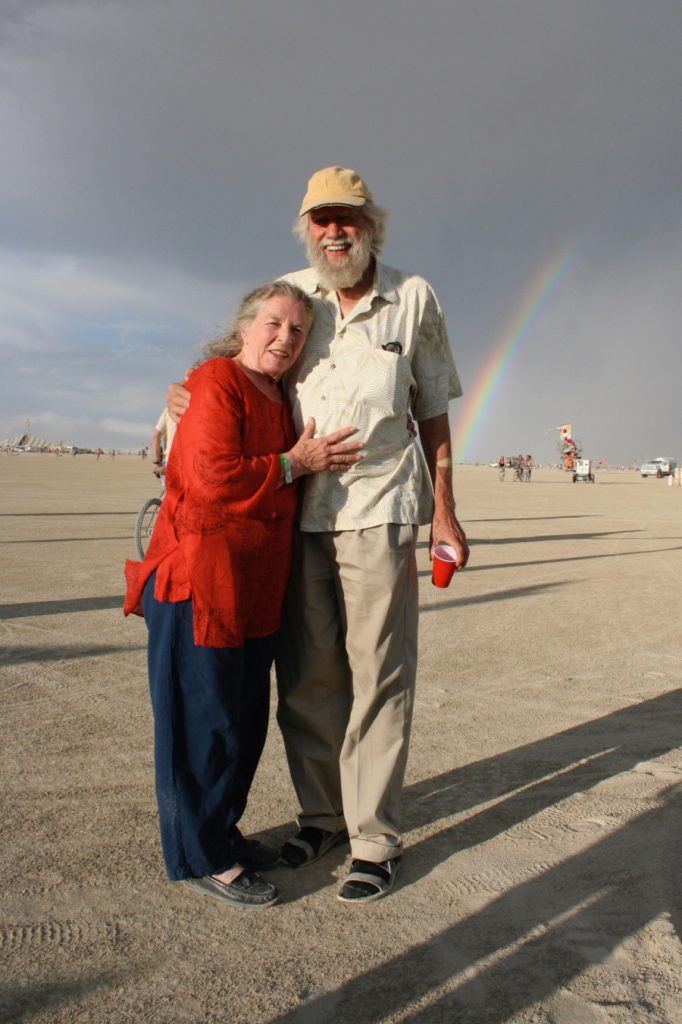
The Shulgins were greeted as countercultural heroes at Burning Man. [Black Rock Desert, Nev., 2008. Photo by Jason Tucker.]
In this first free sample audio clip, Sasha tells about his own extensive drug use and contrasts it with drug abuse using his experience smoking cigarettes as an example.
In 1987 the Partnership for a Drug-Free America began its infamous “This Is Your Brain On Drugs” public service advertising campaign, which told America that using drugs would cook your brain like frying an egg in a skillet. Imagine what it was like in this political climate to hear a college professor confess on the first day of class to his extensive drug experimentation:
I’ll use myself as an example. I’m very familiar with a lot of different psychotropic drugs. Out of some 200, 250 psychedelics I probably have used 150 of them. I am familiar and I have not emerged with conspicuous brain damage so I think I can lay to rest [laughter from the class] that correlative. I have other sorts of damage, but I won’t talk about that. [More laughter.]
But he wasn’t preaching an anything-goes approach. He taught that drug abuse happens when a person doesn’t have a good relationship with a drug.
I, for example, smoked for fifteen years and I smoked good and heavily. I stopped smoking. It was quite a strain. Believe me, that is one of the more addictive drugs (I’ll get into the word addictive and what that means and why I will very rarely use it), one of the more psychological dependence-developing drugs. I stopped it. I stopped it the only way you could ever stop any drug use that you are not totally at peace with and that is by saying, “I choose not to use the drug.”
Throughout the course, Sasha’s candor and humor allowed him to connect with his students and share valuable insights and his personal philosophy. A recurring theme is the autonomy of the individual to decide for oneself—free from government interference—what drugs to take or states of consciousness to experience. He also emphasized the importance of making informed decisions and taking responsibility for one’s actions.
Power, Politics and MDMA

A section of Sasha’s laboratory notebook reporting on his first experience taking MDMA, which he discovered was highly psychoactive.
In this second free sample audio clip, Sasha explains his distrust of authority, especially around drug policy.
One reason Sasha opposed drug laws was that “laws are not easily undone.” This, he said, was because people in power are reluctant to admit mistakes.
The reason they’re in power is they have acceded there over someone else and they’re more powerful or they’re more manipulative, they’re stronger, they’ve got more money, they’ve got more books, they have more friends, they have more clout. That’s how they’ve gotten there. And one of the reasons you stay in power… is not to make mistakes… Whatever it is, it is not a mistake. And if necessary, you will change reality or you will deny something, or you’ll modify something to keep it from being a mistake.
He singled out the government’s decision to classify MDMA, popularly known as Ecstasy, as a Schedule I drug. Sasha discovered MDMA’s psychoactive properties in the 1970s. Ann subsequently found and spread the word about its ability to catalyze breakthroughs in psychotherapy. Yet the government decided it had a high potential for abuse and no accepted medical use. Needless to say, Sasha disagreed:
Well, the truth is it was known to the medical community, it had wide medical use, and there was no conspicuous evidence of abuse potential. But the statement was made. The people who made the statement did not know these things.
The Alchemy of Psychedelics
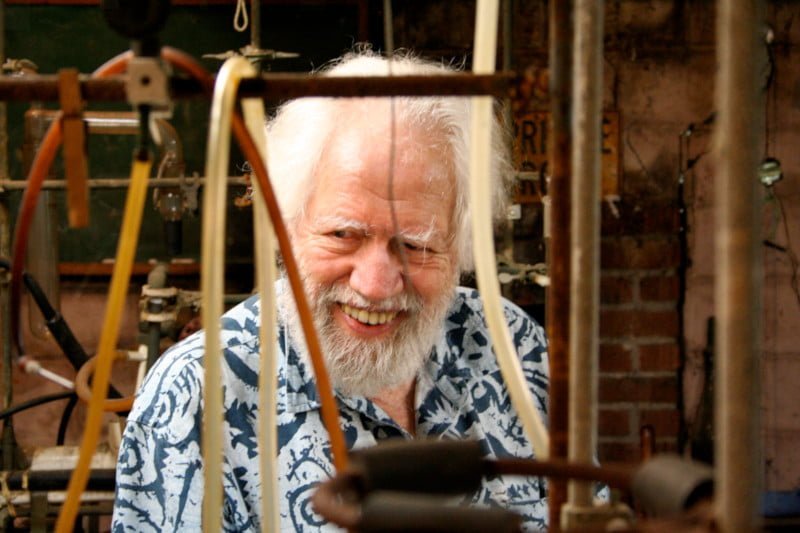
Sasha practiced psychedelic alchemy in his home laboratory converted from a shed on the Shulgins’ property. [Lafayette, Calif., circa 2007. Photo by Jason Tucker.]
In this third free sample audio clip, Sasha shows his wide-ranging knowledge about the alchemy of psychedelics by connecting human consciousness with the mysterious pineal gland.
During his lecture on memory and states of consciousness, Sasha explored connections between biochemistry and altered states. He explained how the pineal gland converts serotonin in the brain to the sleep hormone melatonin, which can be converted, in turn, to a type of psychedelic.
My god, we’ve found the tool! Well, when you look at the pineal, it is invested (with centuries of lore anyway) as being involved in this whole territory: the third eye, the seeing eye, the center of the soul. It produces an alkaloid, a base, that under physiological conditions can metabolize to something that will make you a little bit funny.
As Mariavittoria Mangini wrote in her forward to the book,
Sasha could be persuaded to admit that he was an alchemist. He approached chemistry as a sacred art and was mindful of the way in which the practical and the philosophical, the esoteric and exoteric, intersected in his work.
The Nature of Drugs, Volume One audiobook includes the same material as presented to students in Sasha Shulgin’s popular class.
Ann Shulgin joined the class with her audiocassette tape recorder week after week, as Sasha presented his unique brand, authority and philosophy. Time passed. The tapes were put away and largely forgotten. Several years ago—after Sasha’s death—they were rediscovered among other artifacts in storage at the Shulgins’ home. Ann and her daughter, Wendy Tucker, agreed the material should be shared with the larger public, so Wendy put her team to work turning the “Nature of Drugs” lecture tapes into The Nature of Drugs book published by Transform Press.
First we digitized the old magnetic tapes to protect against damage from handling and to make working with the recordings easier. Then we transcribed and edited the lectures for clarity and ease of reading. This produced the text that Transform Press published in the print and ebook editions. For the audiobook version, a professional narrator read this cleaned up text, preserving the conciseness of the text editions, while enabling better, more listenable sound than the original tapes.
Buy The Nature of Drugs, Volume One audiobook and get the complete Shulgin experience today.
The audiobook makes for a great listening experience, but we wanted to add something extra special: audio clips from the lectures in Sasha’s own voice. We wanted people to have an even greater appreciation for his dynamic teaching style. That’s why we interspersed the regular narration with 24 clips from the original recordings. Listening will make you feel like you’re in the classroom with the world’s greatest psychedelic chemist.
What better way to get the complete Shulgin experience than by hearing his personal commentary from actual lectures? This is your opportunity to listen to one of the most influential thinkers in the field explain his philosophy on drugs, psychopharmacology, states of consciousness, and societal and individual freedoms pertaining to drug use, both medicinal and exploratory.
And if all this weren’t enough, it’s easy to download The Nature of Drugs, Volume One from Transform Press and play it on all your Windows, Android and Apple devices using the Glassboxx app. You could be listening in minutes!
Ready to take a trip into The Nature of Drugs with Sasha Shulgin? Click the button below to download the audiobook and start your journey today.
![]()

